|
|
My Schoolmate
61,0" x 31,5" Hardy Ecke
|
 e who chooses to eat with the devil from one pot will need a long spoon, lest he scald his tongue. e who chooses to eat with the devil from one pot will need a long spoon, lest he scald his tongue.
Of course there is no such spoon.
This text is from the film, "My Schoolmate,"
directed by Robert Siodmak in 1960 and taken from a prizewinning play by Johannes Mario Simmel.
Siodmak's film is based on a true story about a postman who, towards the end of WWII, wrote a letter to Hitler's minister Hermann Göring, his former schoolmate, asking him to bring the war to an end.
Johannes Mario Simmel, an author of popular novels, took this occurrence as the starting point of a story about a simple postman who survives his open-minded and honest, but disastrous letter only because Göring manages to declare him medically insane, but who, after the war, cannot return to his job because he's still officially classified as insane.
Siodmak' adaptation allows an insight into the mechanism of German bureaucracy during the war and after (alas, not such a big difference).
He focuses on the tragedy, and later on tragicomedy, of a man becoming the victim of this bureaucracy.
The postman Ludwig Fuchs is played by Heinz Rühmann, an actor who had started his career in the 1930s and who by the 1950s was considered the most popular German screen actor, the embodiment of the average, ordinary man on whom a pitiless destiny plays nasty tricks.
At the end of the film he states our opening phrase to his younger colleague, Paul.
The character Ludwig Fuchs stands for the man on the street and is powerless against the authorities of government and the arbitrariness of some people.
There's no happy end. The story leaves people behind handling their own destiny.
The changeable swastika armbands symbolize different forms of power under which mankind suffers.
 The coal symbol stands for the power of money The coal symbol stands for the power of money
(coal is a German nickname for money).
Are we not already living in a timocracy?
 The power of drug cartels who use chemicals from German companies to produce cocaine. The power of drug cartels who use chemicals from German companies to produce cocaine.
 The power of the church to ban birth control The power of the church to ban birth control
while we face one of the greatest world problems - overpopulation.
 One armlet remains blank to create the possibility for the viewer to imagine other symbols. One armlet remains blank to create the possibility for the viewer to imagine other symbols.
The neonazi puppet has no mouth because lemmings are voiceless followers of a few Pied Pipers.
Will the chaos-surrounded, shoot-em-up Rambo be a substitute for the honorable ideals of the young people of today.
Addendum 2002:
The description above and the painting are from the year 1991. But as we can see, the topic is even more relevant today. It gives me the shivers when I am thinking of the massacre in 1999 in Littleton Colorado at the Columbine High School or at the 26th of April in 2002 in Erfurt Germany at the Gutenberg High School.
The brutalization of the society is the sign of the times.

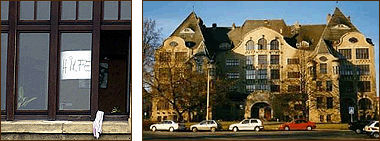
Helpless being at the mercy of a 19 year old gunman on rampage.

Society created a vaccuum instead of taking care of the younger generation and their education. Challenges are missing. Thinking and talking about the problem will not be enough anymore.
Excess energy needs to be led in a positive, reasonable direction.
Unfortunately mankind is weaving from one extreme to another, even though every child knows the saying about the "happy medium".
It might happen again that unemloyment and xenophobia are forged together to form hatred in the dull skulls of the simple minds.
Surprisingly the German politicians do not seem to take this seriously.
The broken thread of the mouthless puppet shows that these stupid Neo-Nazis easily run out of control at any time.
|
|
 |
|
 |



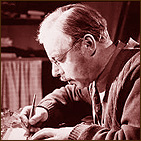

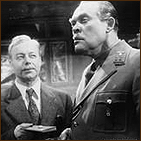

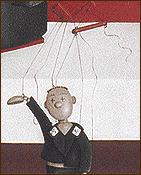



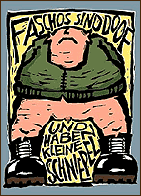

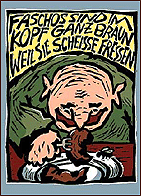

Unfortunately, I can not find the author of these ingenious graphics.
I would like to aknowledge his © copyrights.

|
 |
|

